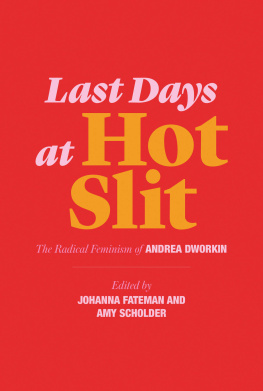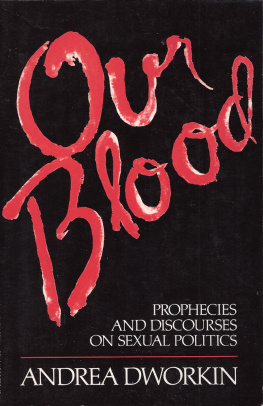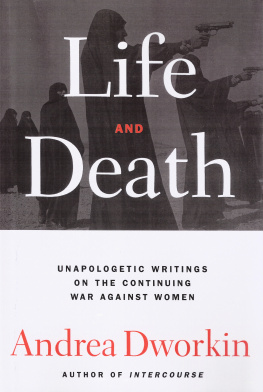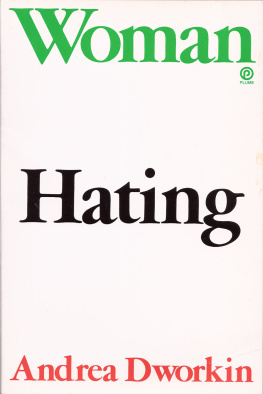Andrea Dworkin - Letters from a War Zone
Here you can read online Andrea Dworkin - Letters from a War Zone full text of the book (entire story) in english for free. Download pdf and epub, get meaning, cover and reviews about this ebook. year: 1993, publisher: Lawrence Hill Books, genre: Romance novel. Description of the work, (preface) as well as reviews are available. Best literature library LitArk.com created for fans of good reading and offers a wide selection of genres:
Romance novel
Science fiction
Adventure
Detective
Science
History
Home and family
Prose
Art
Politics
Computer
Non-fiction
Religion
Business
Children
Humor
Choose a favorite category and find really read worthwhile books. Enjoy immersion in the world of imagination, feel the emotions of the characters or learn something new for yourself, make an fascinating discovery.

- Book:Letters from a War Zone
- Author:
- Publisher:Lawrence Hill Books
- Genre:
- Year:1993
- Rating:5 / 5
- Favourites:Add to favourites
- Your mark:
- 100
- 1
- 2
- 3
- 4
- 5
Letters from a War Zone: summary, description and annotation
We offer to read an annotation, description, summary or preface (depends on what the author of the book "Letters from a War Zone" wrote himself). If you haven't found the necessary information about the book — write in the comments, we will try to find it.
Letters from a War Zone — read online for free the complete book (whole text) full work
Below is the text of the book, divided by pages. System saving the place of the last page read, allows you to conveniently read the book "Letters from a War Zone" online for free, without having to search again every time where you left off. Put a bookmark, and you can go to the page where you finished reading at any time.
Font size:
Interval:
Bookmark:
Pornography and Grief
1978
Pornography and Grief was written as a speech for a Take Back the Night March that was part of the first feminist conference on pornography in the United States in San Francisco, November 1978. Organized by the now defunct Women Against Violence in Pornography and Media (WAVPM), over 5000 women from thirty states participated and we shut down San Francisco's pornography district for one night. The ground was taken but not held.
I searched for something to say here today quite different from what I am going to say. I wanted to come here militant and proud and angry as hell. But more and more, I find that anger is a pale shadow next to the grief I feel. If a woman has any sense of her own intrinsic worth, seeing pornography in small bits and pieces can bring her to a useful rage. Studying pornography in quantity and depth, as I have been doing for more months than I care to remember, will turn that same woman into a mourner.
The pornography itself is vile. To characterize it any other way would be to lie. No plague of male intellectualisms and sophistries can change or hide that simple fact. Georges Bataille, a philosopher of pornography (which he calls "eroticism"), puts it clearly: "In essence, the domain of eroticism is the domain of violence, of violation. "1 Mr Bataille, unlike so many of his peers, is good enough to make explicit that the whole idea is to violate the female. Using the language of grand euphemism so popular with male intellectuals who write on the subject of pornography, Bataille informs us that "[t]he passive, female side is essentially the one that is dissolved as a separate entity. "2 To be "dissolved"by any means necessaryis the role of women in pornography. The great male scientists and philosophers of sexuality, including Kinsey, Havelock Ellis, Wilhelm Reich, and Freud, uphold this view of our purpose and destiny. The great male writers use language more or less beautifully to create us in self-serving fragments, half-"dissolved" as it were, and then proceed to "dissolve" us all the way, by any means necessary. The biographers of the great male artists celebrate the real life atrocities those men have committed against us, as if those atrocities are central to the making of art. And in history, as men have lived it, they have "dissolved" usby any means necessary. The slicing of our skins and the rattling of our bones are the energizing sources of male-defined art and science, as they are the essential content of pornography. The visceral experience of a hatred of women that literally knows no bounds has put me beyond anger and beyond tears; I can only speak to you from grief.
We all expected the world to be different than it is, didn't we? No matter what material or emotional deprivation we have experienced as children or as adults, no matter what we understood from history or from the testimonies of living persons about how people suffer and why, we all believed, however privately, in human possibility. Some of us believed in art, or literature, or music, or religion, or revolution, or in children, or in the redeeming potential of eroticism or affection. No matter what we knew of cruelty, we all believed in kindness; and no matter what we knew of hatred, we all believed in friendship or love. Not one of us could have imagined or would have believed the simple facts of life as we have come to know them: the rapacity of male greed for dominance; the malignancy of male supremacy; the virulent contempt for women that is the very foundation of the culture in which we live. The Women's Movement has forced us all to face the facts, but no matter how brave and clear-sighted we are, no matter how far we are willing to go or are forced to go in viewing reality without romance or illusion, we are simply overwhelmed by the male hatred of our kind, its morbidity, its compulsiveness, its obsessiveness, its celebration of itself in every detail of life and culture. We think that we have grasped this hatred once and for all, seen it in its spectacular cruelty, learned its every secret, got used to it or risen above it or organized against it so as to be protected from its worst excesses. We think that we know all there is to know about what men do to women, even if we cannot imagine why they do what they do, when something happens that simply drives us mad, out of our minds, so that we are again imprisoned like caged animals in the numbing reality of male control, male revenge against no one knows what, male hatred of our very being.
One can know everything and still not imagine snuff films. One can know everything and still be shocked and terrified when a man who attempted to make snuff films is released, despite the testimony of the women undercover agents whom he wanted to torture, murder, and, of course, film. One can know everything and still be stunned and paralyzed when one meets a child who is being continuously raped by her father or some close male relative. One can know everything and still be reduced to sputtering like an idiot when a woman is prosecuted for attempting to abort herself with knitting needles, or when a woman is imprisoned for killing a man who has raped or tortured her, or is raping or torturing her. One can know everything and still want to kill and be dead simultaneously when one sees a celebratory picture of a woman being ground up in a meat grinder on the cover of a national magazine, no matter how putrid the magazine. One can know everything and still somewhere inside refuse to believe that the personal, social, culturally sanctioned violence against women is unlimited, unpredictable, pervasive, constant, ruthless, and happily and unselfconsciously sadistic. One can know everything and still be unable to accept the fact that sex and murder are fused in the male consciousness, so that the one without the imminent possibility of the other is unthinkable and impossible. One can know everything and still, at bottom, refuse to accept that the annihilation of women is the source of meaning and identity for men. One can know everything and still want desperately to know nothing because to face what we know is to question whether life is worth anything at all.
The pornographers, modern and ancient, visual and literary, vulgar and aristocratic, put forth one consistent proposition: erotic pleasure for men is derived from and predicated on the savage destruction of women. As the world's most honored pornographer, the Marquis de Sade (called by male scholars "The Divine Marquis"), wrote in one of his more restrained and civil moments: "There's not a woman on earth who'd ever have had cause to complain of my services if I'd been sure of being able to kill her afterward."3 The eroticization of murder is the essence of pornography, as it is the essence of life. The torturer may be a policeman tearing the fingernails off a victim in a prison cell or a so-called normal man engaged in the project of attempting to fuck a woman to death. The fact is that the process of killingand both rape and battery are steps in that processis the prime sexual act for men in reality and/or in imagination. Women as a class must remain in bondage, subject to the sexual will of men, because the knowledge of an imperial right to kill, whether exercised to the fullest extent or just part way, is necessary to fuel sexual appetite and behavior. Without women as potential or actual victims, men are, in the current sanitized jargon, "sexually dysfunctional. " This same motif also operates among male homosexuals, where force and/or convention designate some males as female or feminized. The plethora of leather and chains among male homosexuals, and the newly fashionable defenses of organized rings of boy prostitution by supposedly radical gay men, are testimony to the fixedness of the male compulsion to dominate and destroy that is the source of sexual pleasure for men.
Next pageFont size:
Interval:
Bookmark:
Similar books «Letters from a War Zone»
Look at similar books to Letters from a War Zone. We have selected literature similar in name and meaning in the hope of providing readers with more options to find new, interesting, not yet read works.
Discussion, reviews of the book Letters from a War Zone and just readers' own opinions. Leave your comments, write what you think about the work, its meaning or the main characters. Specify what exactly you liked and what you didn't like, and why you think so.




